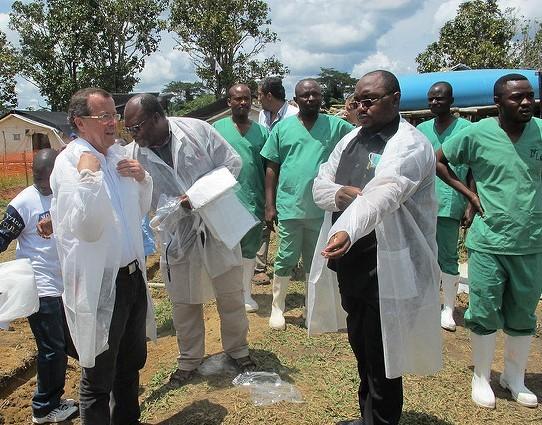Over the weekend, the Democratic Republic of the Congo (DRC) reported 7 more suspected cases of Ebola, raising the totals from Apr 4 through May 13 to 39 confirmed, suspected, and probable cases, including 19 deaths, for a case-fatality rate of 49%.
Only 2 cases have been confirmed by laboratory testing, and 25 are probable. The remaining 12 cases are suspected.
The World Health Organization (WHO) said today that all cases have occurred in three health zones in the DRC: Bikoro (2 confirmed, 20 probable, 7 suspected cases), Iboko (3 probable, 5 suspected) and Wangata (2 probable). To date, 393 contacts have been identified and are being followed up.
Wangata health zone is adjacent to the large city of Mbandaka (population, 1.2 million, according to the WHO). Cases near a major city are a concern, as is the outbreak's location.
"The proximity of the affected area to the Congo River, which links to the Republic of the Congo and the Central African Republic, increases the risk of cases occurring in neighboring countries," the WHO said in today's outbreak update. "Currently, WHO considers the public health risk to be high at the national level, moderate at the regional level, and low at the international level."
Tedros on-site
Yesterday, WHO Director-General Tedros Adhanom Ghebreyesus, PhD, traveled to the DRC, and he tweeted about visiting a hospital in Bikoro and observing the outbreak response. Tedros met with the president of the DRC, Joseph Kabila, and the minister of health, Oly Ilunga Kalenga, MD, to review the steps taken so far.
"I am impressed by the strong leadership the Government of DR Congo showed in the response to this outbreak from day one," said Tedros. "In Bikoro I saw first-hand the efforts the national health authorities and all our partners are investing in rapidly establishing the key elements of Ebola containment."
Tedros led a WHO delegation that included Matshidiso Moeti, MD, WHO regional director for Africa, and Peter Salama, MD, WHO deputy director-general, emergency preparedness and response. The organization deployed 50 health officers over the weekend to assist the DRC in outbreak measures.
So far, the WHO has released $2.6 million from the contingency fund for emergencies to pay for the rapid response. Based on current estimates, the WHO said the DRC will likely require $18 million US for a 3-month operation.
Vaccination request, international traveler
According to both Stat and Reuters, the DRC granted the WHO approval to use the investigational recombinant vesicular stomatitis virus–Zaire Ebola virus (rVSV-ZEBOV) in a ring vaccination targeting close contacts of Ebola patients.
The unlicensed vaccine, manufactured by Merck, could be used as early as next Monday, according to Reuters. The 393 close contacts currently under surveillance for symptoms of Ebola would likely be the first recipients of the vaccine.
Finally, News Agency of Nigeria reported that a passenger at Uganda's Entebbe International Airport is being held in isolation in an Entebbe hospital after showing some symptoms of Ebola virus disease.
The passenger was traveling from the DRC to Kenya and had a high fever. Officials said the man lost his wife 3 weeks ago, but details about her death are unknown at this time.
See also
May 14 WHO report
May 13 WHO Tedros visit story
May 13 Stat story
May 14 Reuters story
May 12 News Agency of Nigeria story



















